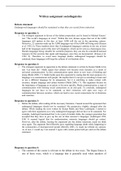Written assignment sociolinguistics
Debate statement
Endangered languages should be sustained so that they are saved from extinction.
Response to question 1:
o The strongest argument in favour of the debate proposition can be found in Michael Krauss’
text “The world’s languages in crisis”. Within this text, Krauss argues that out of the 6,000
languages still spoken to this day, at least 3,000 will die out in the upcoming century.
Moreover, 22 countries make up for 5,000 languages out of the 6,000 still being used (Krauss
et al. 1992, 6). These numbers show that if endangered languages continue to die out, at least
half of the languages used at this time will disappear, which can be seen as a humongous loss.
Besides languages being valuable for scientific purposes, they can also be considered national
treasures for the societies that speak said languages, once they are documented (Krauss et al.
1992, 8). Therefore, to avoid more language deaths, endangered languages should be
sustained, these languages will keep the cultures of civilizations alive.
Response to question 2:
o The strongest argument in opposition to the debate statement is written by Kenan Malik in his
text “Let them die”. Malik argues that cultures will become more dynamic as a result of
universal communication. As this communication opens doors to new ways of thinking and
doing (Malik 2000, 17). Malik builds upon this argument by stating that the main purpose of a
language is to communicate with people. He implies that it is not per se enriching to learn and
or use a different language for its uniqueness, but it is enriching to make contact with
societies, despite language and culture barriers (Malik 2000, 17). This argument focuses on
the importance of language as an action, to be more specific; Phatic communication, a type of
communication with forming social connections as an end goal. To conclude, endangered
languages do not have to be sustained, as their extinction will open new ways of
communication between societies, which can lead to new social connections for civilizations
and countries.
Response to question 3:
o Before the debate, after reading all the necessary literature, I leaned toward the agreement that
endangered languages should not be sustained. My perspective slightly changed after the
debate. While reading the texts written by Kenan Malik and Peter Ladefoged, I started to
agree with their arguments as to why endangered languages did not have to be sustained. For
example, Ladefoged mentioned that; to be a part of modern India, the younger generation has
accepted that they have to give up the use of their ancestor’s languages (Ladefoged 1992,
810). It seemed logical that for modernization, minority languages should go extinct.
However, after the debate, hearing the arguments pro the debate statement, made me think
once again. The argument David Berreby gave regarding language death solely happening in
the communities of disempowered people (Berreby 2003, 2), made me rethink my opinion.
As of now, I would say I am neutral. I agree with certain points both pro and con the debate
statement.
Response to question 4:
o The content of the course is relevant to the debate in two ways. The lingua franca is
one of these ways, which is a language that is generally used when speakers of





